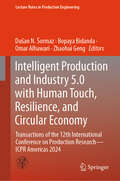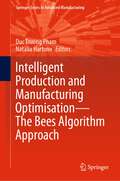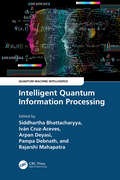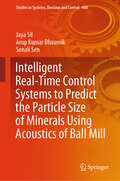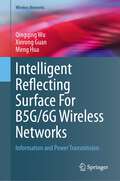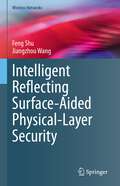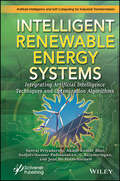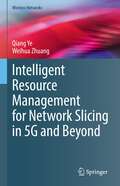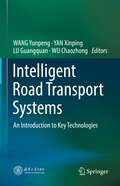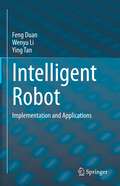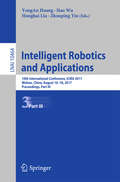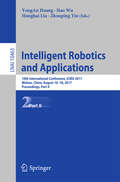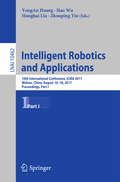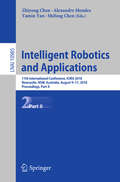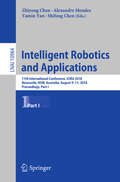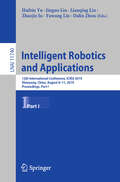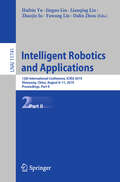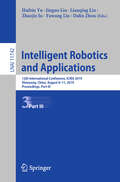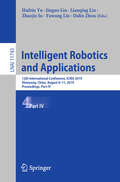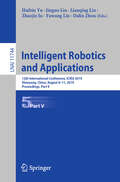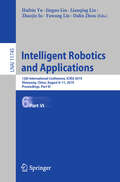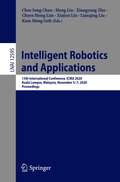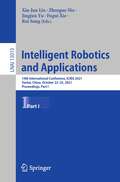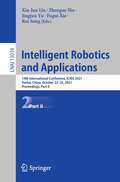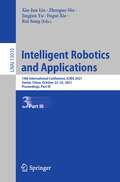- Table View
- List View
Intelligent Production and Industry 5.0 with Human Touch, Resilience, and Circular Economy: Transactions of the 12th International Conference on Production Research – ICPR Americas 2024 (Lecture Notes in Production Engineering)
by Bopaya Bidanda Dušan N. Šormaz Omar Alhawari Zhaohui GengThis volume contains the papers presented at the 12th International Conference on Production Research – Americas, ICPR Americas 2024. The focus and theme of the conference was Intelligent Production and Industry 5.0 with Human touch, Resilience, and Circular Economy. The conference had the majority of authors from the Western Hemisphere, thus providing readers with the current research topics and results in that region towards establishing Industry 5.0 and resilient, intelligent production methods in the theory and practice of production research. As such, the volume establishes direction for the further advancement of circular economy and human advancement. What areas are covered? The book covers the broad area of production research, including the following topics: Intelligent Production for Circular Economy, Smart Factories and Industrial Internet of Things, Sustainable Manufacturing and Engineering, Modelling and Simulation of Manufacturing and Services, Strategies and Approaches to Develop Production Resilience, Digital and Cyber Manufacturing and Services for Industry 4.0 & 5.0, Data Analytics and Smart Manufacturing, Manufacturing Systems and Supply Chains, Human Factors Engineering, and many others shown inside the book. What is the main focus? The presented papers cover new theories in production research, with emphasis on digital and smart manufacturing, lean and agile manufacturing, and sustainable manufacturing and engineering. However, as the ICPR conferences also cover applications of developed theories in industry, it is expected that about 1/3 of papers will have application focus. Who will be interested in reading? The book aims to get the attention of graduate students and early researchers eager to learn new methodologies and theories of production research as its primary audience. However, advanced undergraduate students may also be tempted to learn the topics of the conference as a potential medium in their choices of careers, particularly when considering graduate degrees. This is the first edition of the book, but it also continues the tradition of proceedings from previous ICPR global and regional conferences.
Intelligent Production and Manufacturing Optimisation—The Bees Algorithm Approach (Springer Series in Advanced Manufacturing)
by Duc Truong Pham Natalia HartonoThis book is the first work dedicated to the Bees Algorithm. Following a gentle introduction to the main ideas underpinning the algorithm, the book presents recent results and developments relating to the algorithm and its application to optimisation problems in production and manufacturing. With the advent of the Fourth Industrial Revolution, production and manufacturing processes and systems have become more complex. To obtain the best performance from them requires efficient and effective optimisation techniques that do not depend on the availability of process or system models. Such models are usually either not obtainable or mathematically intractable due to the high degrees of nonlinearities and uncertainties in the processes and systems to be represented. The Bees Algorithm is a powerful swarm-based intelligent optimisation metaheuristic inspired by the foraging behaviour of honeybees. The algorithm is conceptually elegant and extremely easy to apply. All it needs to solve an optimisation problem is a means to evaluate the quality of potential solutions. This book demonstrates the simplicity, effectiveness and versatility of the algorithm and encourages its further adoption by engineers and researchers across the world to realise smart and sustainable manufacturing and production in the age of Industry 4.0 and beyond.
Intelligent Quantum Information Processing (Quantum Machine Intelligence)
by Siddhartha Bhattacharyya Arpan Deyasi Pampa Debnath Rajarshi Mahapatra Iván Cruz-AcevesThe book discusses the foundations of intelligent quantum information processing applied to several real-life engineering problems, including intelligent quantum systems, intelligent quantum communication, intelligent process optimization, and intelligent quantum distributed networks.This book:• Showcases a detailed overview of different quantum machine learning algorithmic frameworks.• Presents real-life case studies and applications.• Provides an in-depth analysis of quantum mechanical principles.• Provides a step-by-step guide in the build-up of quantum inspired/quantum intelligent information processing systems.• Provides a video demonstration on each chapter for better understanding.It will serve as an ideal reference text for graduate students and academic researchers in fields such as electrical engineering, electronics and communication engineering, computer engineering, and information technology.
Intelligent Real-Time Control Systems to Predict the Particle Size of Minerals Using Acoustics of Ball Mill (Studies in Systems, Decision and Control #600)
by Jaya Sil Arup Kumar Bhaumik Sonali SenThis book offers a single-resource reference on different analysis strategies of the ball mill acoustics. One of the major problems in the mining industry is the raw material wastage. The biggest challenge faced by the researchers is to install sensors to acquire meaningful data during the crushing operation due to huge dust and the presence of grinding media. The book aims to propose an intelligent system to predict the particle size distribution of the raw material in the closed-loop mill operation and stop the mill automatically by receiving the desired particle size ranges. The simulated results are validated with the experimental results, obtained from an instrumented lab-based ball mill. The acoustics of the running ball mill is considered as the key parameter which is a state of art in this field. This book will be useful for Researchers who work in the field of Digital signal processing.
Intelligent Reflecting Surface For B5G/6G Wireless Networks: Information and Power Transmission (Wireless Networks)
by Qingqing Wu Xinrong Guan Meng HuaThis book provides comprehensive insights into the theory, models, and unique characteristics of intelligent reflecting surface (IRS) and its appealing applications in wireless information and power transmission for B5G/6G. It is organized as follows:Chapter 1 gives an overview of the fundamentals of IRS, including the signal and channel models of IRS, its hardware architecture, advantages and practical constraints. Chapter 2, 3 and 4 focus on how to optimize the joint design of active and passive beamforming for three types of IRS-aided wireless information/energy transmission systems, namely IRS-aided power transfer (WPT), IRS-aided simultaneous wireless information and power transfer (SWIPT) and IRS-aided wireless powered communication networks (WPCN). Chapter 2 specifically presents a general framework design for IRS-aided WPT systems from the perspectives of energy beamforming design and channel estimation, while the dynamic IRS beamforming design is also discussed. Chapter 3 thoroughly studies the IRS-aided SWIPT for achieving better R-E trade-off, wherein two different designs based on weighted sum-power maximization at energy users (EUs) and under individual quality-of-service (QoS), requirements at both information users (IUs) and EUs are investigated. Chapter 4 presents three paradigms of IRS-aided WPCN, i.e., IRS-aided half-duplex (HD) WPCN, IRS-aided full-duplex (FD) WCPN and IRS-aided multiple-input-multiple-output (MIMO) FD WPCN. The authors present some related emerging topics, e.g., active IRS aided wireless communications and IRS-aided unmanned aerial vehicle (UAV) communications in chapter 5. This book targets postgraduate students studying electrical engineering and computer science, and can be used as a secondary textbook. Professionals, researchers and engineers working in wireless networks will also find this book useful as a reference.
Intelligent Reflecting Surface-Aided Physical-Layer Security (Wireless Networks)
by Jiangzhou Wang Feng ShuThis book discusses the problems of Physical Layer Security (PLS) in Intelligent Reflecting Surface (IRS)-assisted wireless networks.It also discusses the corresponding methods to solve these problems in a comprehensive style. Furthermore, some potential challenges are well analyzed.This book is divided into 11 chapters. Chapter 1 introduces the propagation characteristics of IRS-aided PLS communications. From Chapter 2 to Chapter 10,The authors mainly provide deep investigations of different PLS problems of IRS-aided wireless networks, namely, directional modulation (DM) networks. Chapter 11 draws a conclusion and includes the future research directions.Researchers working in wireless communications, or advanced-level computer science or electrical engineering students, can learn about secure communication in the physical layer through our book.Professionals or engineers working in this field will also benefit from this book.
Intelligent Renewable Energy Systems: Integrating Artificial Intelligence Techniques and Optimization Algorithms
by Akash Kumar Bhoi Sanjeevikumar Padmanaban Neeraj PriyadarshiINTELLIGENT RENEWABLE ENERGY SYSTEMS This collection of papers on artificial intelligence and other methods for improving renewable energy systems, written by industry experts, is a reflection of the state of the art, a must-have for engineers, maintenance personnel, students, and anyone else wanting to stay abreast with current energy systems concepts and technology. Renewable energy is one of the most important subjects being studied, researched, and advanced in today’s world. From a macro level, like the stabilization of the entire world’s economy, to the micro level, like how you are going to heat or cool your home tonight, energy, specifically renewable energy, is on the forefront of the discussion. This book illustrates modelling, simulation, design and control of renewable energy systems employed with recent artificial intelligence (AI) and optimization techniques for performance enhancement. Current renewable energy sources have less power conversion efficiency because of its intermittent and fluctuating behavior. Therefore, in this regard, the recent AI and optimization techniques are able to deal with data ambiguity, noise, imprecision, and nonlinear behavior of renewable energy sources more efficiently compared to classical soft computing techniques. This book provides an extensive analysis of recent state of the art AI and optimization techniques applied to green energy systems. Subsequently, researchers, industry persons, undergraduate and graduate students involved in green energy will greatly benefit from this comprehensive volume, a must-have for any library. Audience Engineers, scientists, managers, researchers, students, and other professionals working in the field of renewable energy.
Intelligent Resource Management for Network Slicing in 5G and Beyond (Wireless Networks)
by Weihua Zhuang Qiang YeThis book provides a timely and comprehensive study of developing efficient network slicing frameworks in both 5G wireless and core networks. It also presents protocol stack layer perspectives, which includes virtual network topology design, end-to-end delay modeling, dynamic resource slicing, and link-layer and transport-layer protocol customization. This book provides basic principles, concepts and technologies for communication, computing and networking. Optimization and queueing analysis techniques are applied to solving different problems for network slicing illustrated in this book as well.Researchers working in the area of network slicing in 5G networks and beyond, and advanced-level students majoring in electrical engineering, computer engineering and computer science will find this book useful as a reference or secondary textbook. Professionals in industry seeking solutions to resource management for 5G networks and beyond will also want to purchase this book.
Intelligent Road Transport Systems: An Introduction to Key Technologies
by Wang Yunpeng Yan Xinping Lu Guangquan Wu ChaozhongIn recent years, the application of intelligent transportation systems (ITS) has steadily expanded, and has become a hot spot of common interest to universities, scientific research institutes, enterprises and institutions in the transportation field. ITS is the product of the deep integration of modern high-tech in the transportation industry, and its development has accompanied that of modern high-tech. ITS is now also becoming part of the Internet of Things (IoT), and is expected to contribute significantly to making our cities smarter and connecting with other infrastructure. Although there are many monographs and textbooks on intelligent transportation, with the advancement of technology and changes in demand, the key technologies of ITS are also rapidly changing.This book chiefly focuses on the main technologies of ITS, examining them from four perspectives: “sense” (perception and management of traffic information, chapters 2 & 3), “transmission” (interaction of traffic information, chapter 4), “prediction” (prediction of traffic states, chapter 6) and “application” (intelligent transportation applications, chapters 6 through 10). Given its scope, the book can be used as a textbook for undergraduates or graduates, as well as a reference book for research institutes and enterprises.This book emphasizes the use of basis traffic engineering principles and state-of-art methodologies to develop functional designs. It largely reflects the authors’ own experience in adapting these methodologies to ITS design. For example, the book addresses various forms of data collection, models used to predict and evaluate traffic states, comprehensive description in connected vehicles, applications for users and traffic managers, etc. The knowledge gained here will allow designers to estimate the performance differences among alternatives and gauge their potential benefits for functional design purposes. To gain the most from the book, readers should be somewhat familiar with the field of traffic engineering and interested in ITS.
Intelligent Robot: Implementation and Applications
by Ying Tan Feng Duan Wenyu LiToday, the development of robots is making steady advances. In particular, the Robot Operating System (ROS) offers a unified platform that greatly facilitates the development of robots and has become a new hotspot for learning and application in the field of robotics research.This book introduces readers to the key technologies and development methods for ROS-based intelligent robots. Covering both the development history of robots and various aspects of programming robots, it offers effective support for beginners.The book is divided into three parts, the first of which introduces the basics of robots, including their definition, development, composition, and key technologies. In turn, the second part covers the hardware and software components and the implementation of functions such as vision, speech, grasping, and autonomous navigation. These functions need to work together to provide user-friendlier and more intelligent service. The third part shows how to develop robots with different functions in different application scenarios.Combining theoretical and practical aspects, with a strong focus on application, this work can be used as a reference book for robotics-related courses. Moreover, it will benefit all readers who are interested in intelligent robot development, sharing essential insights into developing service robots based on ROS.
Intelligent Robotics and Applications
by Honghai Liu Hao Wu Zhouping Yin Yongan HuangThese two volumes constitute the refereed proceedings of the First International Conference on Intelligent Robotics and Applications, ICIRA 2008, held in Wuhan, China, in October 2008. The 265 revised full papers presented were thoroughly reviewed and selected from 552 submissions; they are devoted but not limited to robot motion planning and manipulation; robot control; cognitive robotics; rehabilitation robotics; health care and artificial limb; robot learning; robot vision; human-machine interaction & coordination; mobile robotics; micro/nano mechanical systems; manufacturing automation; multi-axis surface machining; realworld applications.
Intelligent Robotics and Applications
by Honghai Liu Hao Wu Zhouping Yin Yongan HuangThese two volumes constitute the refereed proceedings of the First International Conference on Intelligent Robotics and Applications, ICIRA 2008, held in Wuhan, China, in October 2008. The 265 revised full papers presented were thoroughly reviewed and selected from 552 submissions; they are devoted but not limited to robot motion planning and manipulation; robot control; cognitive robotics; rehabilitation robotics; health care and artificial limb; robot learning; robot vision; human-machine interaction & coordination; mobile robotics; micro/nano mechanical systems; manufacturing automation; multi-axis surface machining; realworld applications.
Intelligent Robotics and Applications: 10th International Conference, Icira 2017, Wuhan, China, August 16-18, 2017. Proceedings, Part I (Lecture Notes in Computer Science #10462)
by Honghai Liu Hao Wu Zhouping Yin Yongan HuangThese two volumes constitute the refereed proceedings of the First International Conference on Intelligent Robotics and Applications, ICIRA 2008, held in Wuhan, China, in October 2008. The 265 revised full papers presented were thoroughly reviewed and selected from 552 submissions; they are devoted but not limited to robot motion planning and manipulation; robot control; cognitive robotics; rehabilitation robotics; health care and artificial limb; robot learning; robot vision; human-machine interaction & coordination; mobile robotics; micro/nano mechanical systems; manufacturing automation; multi-axis surface machining; realworld applications.
Intelligent Robotics and Applications: 11th International Conference, ICIRA 2018, Newcastle, NSW, Australia, August 9–11, 2018, Proceedings, Part II (Lecture Notes in Computer Science #10985)
by Zhiyong Chen Alexandre Mendes Yamin Yan Shifeng ChenThe two volume set LNAI 10984 and LNAI 10985 constitutes the refereed proceedings of the 11th International Conference on Intelligent Robotics and Applications, ICIRA 2018, held in Newcastle, NSW, Australia, in August 2018. The 81 papers presented in the two volumes were carefully reviewed and selected from 129 submissions. The papers in the first volume of the set are organized in topical sections on multi-agent systems and distributed control; human-machine interaction; rehabilitation robotics; sensors and actuators; and industrial robot and robot manufacturing. The papers in the second volume of the set are organized in topical sections on robot grasping and control; mobile robotics and path planning; robotic vision, recognition and reconstruction; and robot intelligence and learning.
Intelligent Robotics and Applications: 11th International Conference, Icira 2018, Newcastle, Nsw, Australia, August 9-11, 2018, Proceedings, Part Ii (Lecture Notes in Computer Science #10985)
by Zhiyong Chen Alexandre Mendes Yamin Yan Shifeng ChenThe two volume set LNAI 10984 and LNAI 10985 constitutes the refereed proceedings of the 11th International Conference on Intelligent Robotics and Applications, ICIRA 2018, held in Newcastle, NSW, Australia, in August 2018. The 81 papers presented in the two volumes were carefully reviewed and selected from 129 submissions. The papers in the first volume of the set are organized in topical sections on multi-agent systems and distributed control; human-machine interaction; rehabilitation robotics; sensors and actuators; and industrial robot and robot manufacturing. The papers in the second volume of the set are organized in topical sections on robot grasping and control; mobile robotics and path planning; robotic vision, recognition and reconstruction; and robot intelligence and learning.
Intelligent Robotics and Applications: 12th International Conference, ICIRA 2019, Shenyang, China, August 8–11, 2019, Proceedings, Part I (Lecture Notes in Computer Science #11740)
by Zhaojie Ju Haibin Yu Jinguo Liu Lianqing Liu Yuwang Liu Dalin ZhouThe volume set LNAI 11740 until LNAI 11745 constitutes the proceedings of the 12th International Conference on Intelligent Robotics and Applications, ICIRA 2019, held in Shenyang, China, in August 2019. The total of 378 full and 25 short papers presented in these proceedings was carefully reviewed and selected from 522 submissions. The papers are organized in topical sections as follows:Part I: collective and social robots; human biomechanics and human-centered robotics; robotics for cell manipulation and characterization; field robots; compliant mechanisms; robotic grasping and manipulation with incomplete information and strong disturbance; human-centered robotics; development of high-performance joint drive for robots; modular robots and other mechatronic systems; compliant manipulation learning and control for lightweight robot. Part II: power-assisted system and control; bio-inspired wall climbing robot; underwater acoustic and optical signal processing for environmental cognition; piezoelectric actuators and micro-nano manipulations; robot vision and scene understanding; visual and motional learning in robotics; signal processing and underwater bionic robots; soft locomotion robot; teleoperation robot; autonomous control of unmanned aircraft systems. Part III: marine bio-inspired robotics and soft robotics: materials, mechanisms, modelling, and control; robot intelligence technologies and system integration; continuum mechanisms and robots; unmanned underwater vehicles; intelligent robots for environment detection or fine manipulation; parallel robotics; human-robot collaboration; swarm intelligence and multi-robot cooperation; adaptive and learning control system; wearable and assistive devices and robots for healthcare; nonlinear systems and control. Part IV: swarm intelligence unmanned system; computational intelligence inspired robot navigation and SLAM; fuzzy modelling for automation, control, and robotics; development of ultra-thin-film, flexible sensors, and tactile sensation; robotic technology for deep space exploration; wearable sensing based limb motor function rehabilitation; pattern recognition and machine learning; navigation/localization. Part V: robot legged locomotion; advanced measurement and machine vision system; man-machine interactions; fault detection, testing and diagnosis; estimation and identification; mobile robots and intelligent autonomous systems; robotic vision, recognition and reconstruction; robot mechanism and design. Part VI: robot motion analysis and planning; robot design, development and control; medical robot; robot intelligence, learning and linguistics; motion control; computer integrated manufacturing; robot cooperation; virtual and augmented reality; education in mechatronics engineering; robotic drilling and sampling technology; automotive systems; mechatronics in energy systems; human-robot interaction.
Intelligent Robotics and Applications: 12th International Conference, ICIRA 2019, Shenyang, China, August 8–11, 2019, Proceedings, Part II (Lecture Notes in Computer Science #11741)
by Zhaojie Ju Haibin Yu Jinguo Liu Lianqing Liu Yuwang Liu Dalin ZhouThe volume set LNAI 11740 until LNAI 11745 constitutes the proceedings of the 12th International Conference on Intelligent Robotics and Applications, ICIRA 2019, held in Shenyang, China, in August 2019. The total of 378 full and 25 short papers presented in these proceedings was carefully reviewed and selected from 522 submissions. The papers are organized in topical sections as follows:Part I: collective and social robots; human biomechanics and human-centered robotics; robotics for cell manipulation and characterization; field robots; compliant mechanisms; robotic grasping and manipulation with incomplete information and strong disturbance; human-centered robotics; development of high-performance joint drive for robots; modular robots and other mechatronic systems; compliant manipulation learning and control for lightweight robot. Part II: power-assisted system and control; bio-inspired wall climbing robot; underwater acoustic and optical signal processing for environmental cognition; piezoelectric actuators and micro-nano manipulations; robot vision and scene understanding; visual and motional learning in robotics; signal processing and underwater bionic robots; soft locomotion robot; teleoperation robot; autonomous control of unmanned aircraft systems. Part III: marine bio-inspired robotics and soft robotics: materials, mechanisms, modelling, and control; robot intelligence technologies and system integration; continuum mechanisms and robots; unmanned underwater vehicles; intelligent robots for environment detection or fine manipulation; parallel robotics; human-robot collaboration; swarm intelligence and multi-robot cooperation; adaptive and learning control system; wearable and assistive devices and robots for healthcare; nonlinear systems and control. Part IV: swarm intelligence unmanned system; computational intelligence inspired robot navigation and SLAM; fuzzy modelling for automation, control, and robotics; development of ultra-thin-film, flexible sensors, and tactile sensation; robotic technology for deep space exploration; wearable sensing based limb motor function rehabilitation; pattern recognition and machine learning; navigation/localization. Part V: robot legged locomotion; advanced measurement and machine vision system; man-machine interactions; fault detection, testing and diagnosis; estimation and identification; mobile robots and intelligent autonomous systems; robotic vision, recognition and reconstruction; robot mechanism and design. Part VI: robot motion analysis and planning; robot design, development and control; medical robot; robot intelligence, learning and linguistics; motion control; computer integrated manufacturing; robot cooperation; virtual and augmented reality; education in mechatronics engineering; robotic drilling and sampling technology; automotive systems; mechatronics in energy systems; human-robot interaction.
Intelligent Robotics and Applications: 12th International Conference, ICIRA 2019, Shenyang, China, August 8–11, 2019, Proceedings, Part III (Lecture Notes in Computer Science #11742)
by Zhaojie Ju Haibin Yu Jinguo Liu Lianqing Liu Yuwang Liu Dalin ZhouThe volume set LNAI 11740 until LNAI 11745 constitutes the proceedings of the 12th International Conference on Intelligent Robotics and Applications, ICIRA 2019, held in Shenyang, China, in August 2019. The total of 378 full and 25 short papers presented in these proceedings was carefully reviewed and selected from 522 submissions. The papers are organized in topical sections as follows:Part I: collective and social robots; human biomechanics and human-centered robotics; robotics for cell manipulation and characterization; field robots; compliant mechanisms; robotic grasping and manipulation with incomplete information and strong disturbance; human-centered robotics; development of high-performance joint drive for robots; modular robots and other mechatronic systems; compliant manipulation learning and control for lightweight robot. Part II: power-assisted system and control; bio-inspired wall climbing robot; underwater acoustic and optical signal processing for environmental cognition; piezoelectric actuators and micro-nano manipulations; robot vision and scene understanding; visual and motional learning in robotics; signal processing and underwater bionic robots; soft locomotion robot; teleoperation robot; autonomous control of unmanned aircraft systems. Part III: marine bio-inspired robotics and soft robotics: materials, mechanisms, modelling, and control; robot intelligence technologies and system integration; continuum mechanisms and robots; unmanned underwater vehicles; intelligent robots for environment detection or fine manipulation; parallel robotics; human-robot collaboration; swarm intelligence and multi-robot cooperation; adaptive and learning control system; wearable and assistive devices and robots for healthcare; nonlinear systems and control. Part IV: swarm intelligence unmanned system; computational intelligence inspired robot navigation and SLAM; fuzzy modelling for automation, control, and robotics; development of ultra-thin-film, flexible sensors, and tactile sensation; robotic technology for deep space exploration; wearable sensing based limb motor function rehabilitation; pattern recognition and machine learning; navigation/localization. Part V: robot legged locomotion; advanced measurement and machine vision system; man-machine interactions; fault detection, testing and diagnosis; estimation and identification; mobile robots and intelligent autonomous systems; robotic vision, recognition and reconstruction; robot mechanism and design. Part VI: robot motion analysis and planning; robot design, development and control; medical robot; robot intelligence, learning and linguistics; motion control; computer integrated manufacturing; robot cooperation; virtual and augmented reality; education in mechatronics engineering; robotic drilling and sampling technology; automotive systems; mechatronics in energy systems; human-robot interaction.
Intelligent Robotics and Applications: 12th International Conference, ICIRA 2019, Shenyang, China, August 8–11, 2019, Proceedings, Part IV (Lecture Notes in Computer Science #11743)
by Zhaojie Ju Haibin Yu Jinguo Liu Lianqing Liu Yuwang Liu Dalin ZhouThe volume set LNAI 11740 until LNAI 11745 constitutes the proceedings of the 12th International Conference on Intelligent Robotics and Applications, ICIRA 2019, held in Shenyang, China, in August 2019. The total of 378 full and 25 short papers presented in these proceedings was carefully reviewed and selected from 522 submissions. The papers are organized in topical sections as follows:Part I: collective and social robots; human biomechanics and human-centered robotics; robotics for cell manipulation and characterization; field robots; compliant mechanisms; robotic grasping and manipulation with incomplete information and strong disturbance; human-centered robotics; development of high-performance joint drive for robots; modular robots and other mechatronic systems; compliant manipulation learning and control for lightweight robot. Part II: power-assisted system and control; bio-inspired wall climbing robot; underwater acoustic and optical signal processing for environmental cognition; piezoelectric actuators and micro-nano manipulations; robot vision and scene understanding; visual and motional learning in robotics; signal processing and underwater bionic robots; soft locomotion robot; teleoperation robot; autonomous control of unmanned aircraft systems. Part III: marine bio-inspired robotics and soft robotics: materials, mechanisms, modelling, and control; robot intelligence technologies and system integration; continuum mechanisms and robots; unmanned underwater vehicles; intelligent robots for environment detection or fine manipulation; parallel robotics; human-robot collaboration; swarm intelligence and multi-robot cooperation; adaptive and learning control system; wearable and assistive devices and robots for healthcare; nonlinear systems and control. Part IV: swarm intelligence unmanned system; computational intelligence inspired robot navigation and SLAM; fuzzy modelling for automation, control, and robotics; development of ultra-thin-film, flexible sensors, and tactile sensation; robotic technology for deep space exploration; wearable sensing based limb motor function rehabilitation; pattern recognition and machine learning; navigation/localization. Part V: robot legged locomotion; advanced measurement and machine vision system; man-machine interactions; fault detection, testing and diagnosis; estimation and identification; mobile robots and intelligent autonomous systems; robotic vision, recognition and reconstruction; robot mechanism and design. Part VI: robot motion analysis and planning; robot design, development and control; medical robot; robot intelligence, learning and linguistics; motion control; computer integrated manufacturing; robot cooperation; virtual and augmented reality; education in mechatronics engineering; robotic drilling and sampling technology; automotive systems; mechatronics in energy systems; human-robot interaction.
Intelligent Robotics and Applications: 12th International Conference, ICIRA 2019, Shenyang, China, August 8–11, 2019, Proceedings, Part V (Lecture Notes in Computer Science #11744)
by Zhaojie Ju Haibin Yu Jinguo Liu Lianqing Liu Yuwang Liu Dalin ZhouThe volume set LNAI 11740 until LNAI 11745 constitutes the proceedings of the 12th International Conference on Intelligent Robotics and Applications, ICIRA 2019, held in Shenyang, China, in August 2019. The total of 378 full and 25 short papers presented in these proceedings was carefully reviewed and selected from 522 submissions. The papers are organized in topical sections as follows:Part I: collective and social robots; human biomechanics and human-centered robotics; robotics for cell manipulation and characterization; field robots; compliant mechanisms; robotic grasping and manipulation with incomplete information and strong disturbance; human-centered robotics; development of high-performance joint drive for robots; modular robots and other mechatronic systems; compliant manipulation learning and control for lightweight robot. Part II: power-assisted system and control; bio-inspired wall climbing robot; underwater acoustic and optical signal processing for environmental cognition; piezoelectric actuators and micro-nano manipulations; robot vision and scene understanding; visual and motional learning in robotics; signal processing and underwater bionic robots; soft locomotion robot; teleoperation robot; autonomous control of unmanned aircraft systems. Part III: marine bio-inspired robotics and soft robotics: materials, mechanisms, modelling, and control; robot intelligence technologies and system integration; continuum mechanisms and robots; unmanned underwater vehicles; intelligent robots for environment detection or fine manipulation; parallel robotics; human-robot collaboration; swarm intelligence and multi-robot cooperation; adaptive and learning control system; wearable and assistive devices and robots for healthcare; nonlinear systems and control. Part IV: swarm intelligence unmanned system; computational intelligence inspired robot navigation and SLAM; fuzzy modelling for automation, control, and robotics; development of ultra-thin-film, flexible sensors, and tactile sensation; robotic technology for deep space exploration; wearable sensing based limb motor function rehabilitation; pattern recognition and machine learning; navigation/localization. Part V: robot legged locomotion; advanced measurement and machine vision system; man-machine interactions; fault detection, testing and diagnosis; estimation and identification; mobile robots and intelligent autonomous systems; robotic vision, recognition and reconstruction; robot mechanism and design. Part VI: robot motion analysis and planning; robot design, development and control; medical robot; robot intelligence, learning and linguistics; motion control; computer integrated manufacturing; robot cooperation; virtual and augmented reality; education in mechatronics engineering; robotic drilling and sampling technology; automotive systems; mechatronics in energy systems; human-robot interaction.
Intelligent Robotics and Applications: 12th International Conference, ICIRA 2019, Shenyang, China, August 8–11, 2019, Proceedings, Part VI (Lecture Notes in Computer Science #11745)
by Zhaojie Ju Haibin Yu Jinguo Liu Lianqing Liu Yuwang Liu Dalin ZhouThe volume set LNAI 11740 until LNAI 11745 constitutes the proceedings of the 12th International Conference on Intelligent Robotics and Applications, ICIRA 2019, held in Shenyang, China, in August 2019. The total of 378 full and 25 short papers presented in these proceedings was carefully reviewed and selected from 522 submissions. The papers are organized in topical sections as follows:Part I: collective and social robots; human biomechanics and human-centered robotics; robotics for cell manipulation and characterization; field robots; compliant mechanisms; robotic grasping and manipulation with incomplete information and strong disturbance; human-centered robotics; development of high-performance joint drive for robots; modular robots and other mechatronic systems; compliant manipulation learning and control for lightweight robot. Part II: power-assisted system and control; bio-inspired wall climbing robot; underwater acoustic and optical signal processing for environmental cognition; piezoelectric actuators and micro-nano manipulations; robot vision and scene understanding; visual and motional learning in robotics; signal processing and underwater bionic robots; soft locomotion robot; teleoperation robot; autonomous control of unmanned aircraft systems. Part III: marine bio-inspired robotics and soft robotics: materials, mechanisms, modelling, and control; robot intelligence technologies and system integration; continuum mechanisms and robots; unmanned underwater vehicles; intelligent robots for environment detection or fine manipulation; parallel robotics; human-robot collaboration; swarm intelligence and multi-robot cooperation; adaptive and learning control system; wearable and assistive devices and robots for healthcare; nonlinear systems and control. Part IV: swarm intelligence unmanned system; computational intelligence inspired robot navigation and SLAM; fuzzy modelling for automation, control, and robotics; development of ultra-thin-film, flexible sensors, and tactile sensation; robotic technology for deep space exploration; wearable sensing based limb motor function rehabilitation; pattern recognition and machine learning; navigation/localization. Part V: robot legged locomotion; advanced measurement and machine vision system; man-machine interactions; fault detection, testing and diagnosis; estimation and identification; mobile robots and intelligent autonomous systems; robotic vision, recognition and reconstruction; robot mechanism and design. Part VI: robot motion analysis and planning; robot design, development and control; medical robot; robot intelligence, learning and linguistics; motion control; computer integrated manufacturing; robot cooperation; virtual and augmented reality; education in mechatronics engineering; robotic drilling and sampling technology; automotive systems; mechatronics in energy systems; human-robot interaction.
Intelligent Robotics and Applications: 13th International Conference, ICIRA 2020, Kuala Lumpur, Malaysia, November 5–7, 2020, Proceedings (Lecture Notes in Computer Science #12595)
by Hong Liu Chee Seng Chan Lianqing Liu Xiangyang Zhu Chern Hong Lim Xinjun Liu Kam Meng GohThis book constitutes the proceedings of the 13th International Conference on Intelligent Robotics and Applications, ICIRA 2020, held in Kuala Lumpur, Malaysia, in November 2020. The 45 full papers and 3 short papers were carefully reviewed and selected from 66 submissions. The accepted papers were grouped into various subtopics including Advanced Measurement and Machine Vision System; Automation; Human-Robot Interaction; Mobile Robots and Intelligent Autonomous System; Recent Trends in Computational Intelligence; Robot Design, and Development and Control.Due to the Corona pandemic ICIRA 2020 was held as a virtual event.
Intelligent Robotics and Applications: 14th International Conference, ICIRA 2021, Yantai, China, October 22–25, 2021, Proceedings, Part I (Lecture Notes in Computer Science #13013)
by Xin-Jun Liu Zhenguo Nie Jingjun Yu Fugui Xie Rui SongThe 4-volume set LNAI 13013 – 13016 constitutes the proceedings of the 14th International Conference on Intelligent Robotics and Applications, ICIRA 2021, which took place in Yantai, China, during October 22-25, 2021.The 299 papers included in these proceedings were carefully reviewed and selected from 386 submissions. They were organized in topical sections as follows: Robotics dexterous manipulation; sensors, actuators, and controllers for soft and hybrid robots; cable-driven parallel robot; human-centered wearable robotics; hybrid system modeling and human-machine interface; robot manipulation skills learning; micro_nano materials, devices, and systems for biomedical applications; actuating, sensing, control, and instrumentation for ultra-precision engineering; human-robot collaboration; robotic machining; medical robot; machine intelligence for human motion analytics; human-robot interaction for service robots; novel mechanisms, robots and applications; space robot and on-orbit service; neural learning enhanced motion planning and control for human robot interaction; medical engineering.
Intelligent Robotics and Applications: 14th International Conference, ICIRA 2021, Yantai, China, October 22–25, 2021, Proceedings, Part II (Lecture Notes in Computer Science #13014)
by Xin-Jun Liu Zhenguo Nie Jingjun Yu Fugui Xie Rui SongThe 4-volume set LNAI 13013 – 13016 constitutes the proceedings of the 14th International Conference on Intelligent Robotics and Applications, ICIRA 2021, which took place in Yantai, China, during October 22-25, 2021.The 299 papers included in these proceedings were carefully reviewed and selected from 386 submissions. They were organized in topical sections as follows: Robotics dexterous manipulation; sensors, actuators, and controllers for soft and hybrid robots; cable-driven parallel robot; human-centered wearable robotics; hybrid system modeling and human-machine interface; robot manipulation skills learning; micro_nano materials, devices, and systems for biomedical applications; actuating, sensing, control, and instrumentation for ultra-precision engineering; human-robot collaboration; robotic machining; medical robot; machine intelligence for human motion analytics; human-robot interaction for service robots; novel mechanisms, robots and applications; space robot and on-orbit service; neural learning enhanced motion planning and control for human robot interaction; medical engineering.
Intelligent Robotics and Applications: 14th International Conference, ICIRA 2021, Yantai, China, October 22–25, 2021, Proceedings, Part III (Lecture Notes in Computer Science #13015)
by Xin-Jun Liu Zhenguo Nie Jingjun Yu Fugui Xie Rui SongThe 4-volume set LNAI 13013 – 13016 constitutes the proceedings of the 14th International Conference on Intelligent Robotics and Applications, ICIRA 2021, which took place in Yantai, China, during October 22-25, 2021.The 299 papers included in these proceedings were carefully reviewed and selected from 386 submissions. They were organized in topical sections as follows: Robotics dexterous manipulation; sensors, actuators, and controllers for soft and hybrid robots; cable-driven parallel robot; human-centered wearable robotics; hybrid system modeling and human-machine interface; robot manipulation skills learning; micro_nano materials, devices, and systems for biomedical applications; actuating, sensing, control, and instrumentation for ultra-precision engineering; human-robot collaboration; robotic machining; medical robot; machine intelligence for human motion analytics; human-robot interaction for service robots; novel mechanisms, robots and applications; space robot and on-orbit service; neural learning enhanced motion planning and control for human robot interaction; medical engineering.
